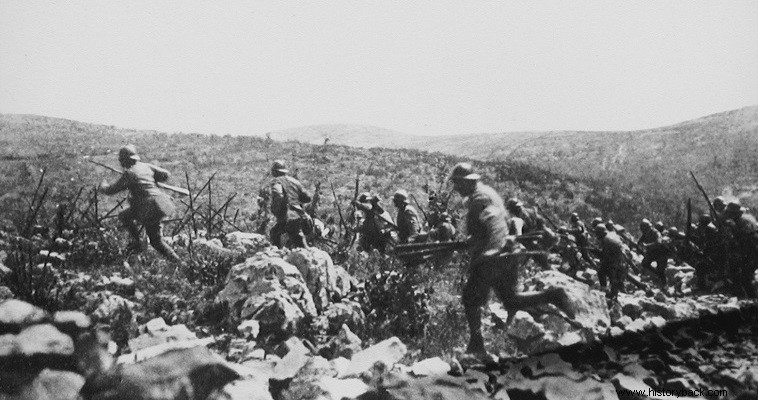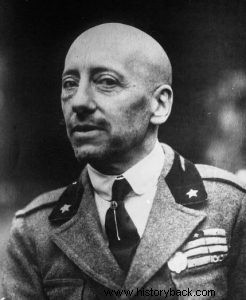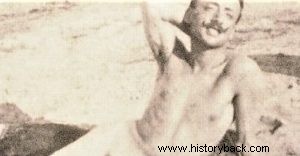
Gabriel d'Annunzio is a peculiar historical figure. A fanatical Italian nationalist and harbinger of fascism, he fought in the First World War and, not without reason, can be considered the moral perpetrator of terrible crimes against the Italian soldiers by their incompetent administration. A romantic to the point of stupidity that cost blood, he conceived, being a captain, the plan to launch a "prestige attack", after the disastrous 10th Battle of Isonzo for Italian weapons.
The 10th Battle of the Isonzo, i.e. the 10th consecutive Italian offensive, since May 1915, in the area of the river of the same name, began on May 12, 1917. The Italians overwhelmingly outnumbered their opponents in men and guns and initially advanced. However, the Austrians stopped them with counterattacks and recovered most of the lost ground.
On May 28, at the suggestion of d'Annunzio, it was decided to carry out an attack in the area of San Giovanni, near the coastal road to Trieste which was held by the Austrians and which was the target of the Italian attacks. The main point of support for the Austrians in the area was hill 28. The hill was east of the small river Timavos, the banks of which at that point were about 30m apart. among themselves.
D'Annunzio, always ready to raise the Italian prestige which had been badly hurt by the new failure to break the Austrian defences, thought of carrying out an attack with a purely propaganda aim. An Italian battalion would cross the river, capture Hill 28, cross 2 km of open ground to the enemy-held village of Duino, capture the ruined castle there, and raise a huge Italian emplacement so that it could be seen the "enslaved Italian brothers" in Trieste!
It was purely a matter of science fiction, but nevertheless the Italian military leadership under the infamous general Luigi Cantorna, accepted the proposal of the enormously prestigious "poet", "patriot", soldier and pilot d'Annunzio. The attack was decided to be carried out by a battalion of the 77th Regiment of the "Tuscan Wolves" - known in Greece since the 1940-41 conflict - under major Radatzio .
The attack was doomed from the start and there was not the slightest hope of success, as they would not even be supported by artillery. The hapless Italian soldiers crossed the river on a crude floating bridge made of barrels and planks, only 40 cm wide. Major Radazio had, of course, objections to the foolish undertaking which had no practical counterpoint as, even if the plan succeeded Trieste was 20 km from the ruined castle and only with a telescope could one see the Italian flag...
For the fanatic d'Annunzio, however, the major simply "didn't have enough faith"... When it was proposed to cancel the operation, d'Annunzio, although a simple captain, immediately appealed to the higher command who supported him, as did the Duke of Aosta , commander of the Italian 3rd Army in whose sector the project would be carried out.
But when the operation began, Major Radazio's fears were confirmed in the worst way. Under heavy fire, some Italian soldiers managed to cross the bridge in a man-by-man phalanx. Others, seeing the fate that awaited her, refused to move and declared to their officers that they refused to be slaughtered without reason. Some tied white handkerchiefs to their weapons and surrendered to the Austrians. The survivors, who were not captured, of the section that had crossed the river returned by crossing again over the wretched narrow bridge under heavy fire.
Of course most were mowed down by the Austrian machine guns. The "brave" d'Annunzio himself had not of course crossed the river, despite what was falsely reported later and recorded in the official Italian military history. The phalanx of Italian prisoners, ordered by d'Annunzio, was hit by Italian artillery fire. The "poet" was sure that few spirited men could have carried out his stupid plan.
Radazio was also mortally wounded. The morale of the Italian army sank further after the fiasco that the next day, at this point, an entire Italian battalion surrendered to the Austrians without a fight. What else could they do? The Italian soldiers were in more danger from their own officers than from the enemy, who had gone so far as to beg the Italians to stop the suicide attacks!
It is worth noting that the dying Radazio asked d'Annunzio for poison, which the latter always had with him, in order to get rid of the horrible pains. The "poet" refused it because "he had to suffer so that his life would become majestic in the immortality of death...".
D'Annunzio at one point feared that "those cowards", the surviving soldiers with terror on their faces, might shoot him or kill him with their bayonets. However, "every Italian bullet or lance that hit him would turn into a diamond"... On the eve of the attack, however, d'Annunzio dreamed of the breasts of his married mistress from Trieste!

The "poet" in military uniform.

The "poet" in... a special pose.
